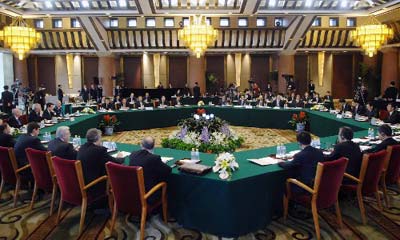
A general view of the opening ceremony of the six-party talks on
North Korea's nuclear program in Beijing yesterday. (Xinhua/Reuters
Photo)
The six-party talks on the Korean Peninsula nuclear issue resumed yesterday
afternoon in Beijing, focusing on the first steps towards denuclearization of
the peninsula.
Chinese chief negotiator Wu Dawei made a speech at the opening ceremony at
Diaoyutai State Guesthouse in downtown Beijing, the venue for the talks since
2003.
"I hope the meeting will be a good beginning for implementing the joint
statement, and a new starting point in the process of denuclearization of the
Korean Peninsula," said Wu.
After the last session of the talks which ended in December with no
breakthrough, the parties have been engaged in a flurry of diplomatic activity
to restart the talks.
"Delegates from the DPRK and the United States have had productive contacts,"
said Wu. "All the various efforts have laid a more mature foundation for
reconvening the talks."
A plenary session was held after the opening ceremony, in a "frank and
practical" atmosphere, according to sources with the Chinese Foreign Ministry.
The six delegation heads reiterated their willingness and determination to
pursue the six-party talks, resolve the Korean Peninsula nuclear issue and
achieve denuclearization of the Korean Peninsula through dialogue and in a
peaceful manner, according to the sources.
The six top negotiators agreed to strive to reach consensus on the initial
steps of the implementation of the Sept. 19 joint statement, the sources said.
Under the joint statement, signed during the fourth round of talks in 2005,
the Democratic People's Republic of Korea (DPRK) agreed to abandon its nuclear
program in exchange for economic aid and security guarantees.
Spokesman for the Chinese delegation Qin Gang said "the plenary session was
candid and pragmatic, all sides exchanged views on initial steps of the
implementation of the Sept. 19 joint statement, and made some constructive
suggestions."
Qin told a press briefing after the session that China hopes all sides can
soon reach consensus on the initial steps and end this phase of meetings as
early as possible.
It is hoped that this phase of meetings will end before the Chinese lunar New
Year, which falls on Feb. 18, which is an important festival for China, the DPRK
and the Republic of Korea (ROK).
But the meetings will continue as long as necessary, he said.
Today's meeting shows that the six parties are beginning to develop
consensus, which will promote understanding and trust between all sides and
promote the six-party talks process, Qin said.
He also called for other parties to show more confidence and patience, and
cherish the resumption of the talks as an opportunity to lay a good foundation
for future.
According to Qin, the establishment of working groups will be discussed
during this phase of meetings.
A spokesman from the Japanese delegation said that all sides can contribute
to measures for denuclearization through working group discussions.
It is necessary for all sides to map out an action plan or measures for the
implementation of the Sept. 19 joint statement, and the statement should be
implemented in a comprehensive and balanced way, he said at a Japanese press
conference in the embassy.
However, he stressed that the DPRK must stop and seal up all nuclear devices,
and accept supervision from the International Atomic Energy Agency(IAEA).
Chief ROK delegate Chun Yung Woo also expressed hope for an early consensus
on the initial steps, saying this will be very important for the implementation
of the joint statement and for building trust.
He said this round of meetings may draft a joint document earlier than
previously, since the parties have had frequent bilateral contacts prior to the
meeting, and reached a certain degree of consensus.
US chief negotiator Christopher Hill said the six parties are "coalescing
around" some themes, and "we hope we can achieve some kind of joint statement
here".
It is expected that the Chinese side will circulate a draft later Thursday or
early Friday in this regard, Hill told reporters after dinner.
Hill said if the United States and the DPRK can agree on what they discussed
today, "it will be a clear sign that we are moving along the path and a clear
sign that we will move towards full implementation of the September statement".
But he is still a little cautious about the prospect of an agreement, saying
"it is not easy to achieve these actions. because the first step of a journey is
often a difficult step".



